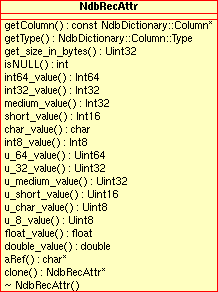- 2.3 NDB API Classes, Interfaces, and Structures
- 2.3.1 The Column Class
- 2.3.2 The Datafile Class
- 2.3.3 The Dictionary Class
- 2.3.4 The Event Class
- 2.3.5 The Index Class
- 2.3.6 The LogfileGroup Class
- 2.3.7 The List Class
- 2.3.8 The Ndb Class
- 2.3.9 The NdbBlob Class
- 2.3.10 The NdbDictionary Class
- 2.3.11 The NdbEventOperation Class
- 2.3.12 The NdbIndexOperation Class
- 2.3.13 The NdbIndexScanOperation Class
- 2.3.14 The NdbInterpretedCode Class
- 2.3.15 The NdbOperation Class
- 2.3.16 The NdbRecAttr Class
- 2.3.17 The NdbScanFilter Class
- 2.3.18 The NdbScanOperation Class
- 2.3.19 The NdbTransaction Class
- 2.3.20 The Object Class
- 2.3.21 The Table Class
- 2.3.22 The Tablespace Class
- 2.3.23 The Undofile Class
- 2.3.24 The Ndb_cluster_connection Class
- 2.3.25 The NdbRecord Interface
- 2.3.26 The AutoGrowSpecification Structure
- 2.3.27 The Element Structure
- 2.3.28 The GetValueSpec Structure
- 2.3.29 The IndexBound Structure
- 2.3.30 The Key_part_ptr Structure
- 2.3.31 The NdbError Structure
- 2.3.32 The OperationOptions Structure
- 2.3.33 The PartitionSpec Structure
- 2.3.34 The RecordSpecification Structure
- 2.3.35 The ScanOptions Structure
- 2.3.36 The SetValueSpec Structure
Abstract
The section describes the NdbRecAttr class and
its public methods.
Parent class. None
Child classes. None
Description.
NdbRecAttr contains the value of an attribute.
An NdbRecAttr object is used to store an
attribute value after it has been retrieved the
NDB Cluster using the
NdbOperation::getValue(). This object is
allocated by the NDB API. A brief example is shown here:
MyRecAttr = MyOperation->getValue("ATTR2", NULL);
if(MyRecAttr == NULL)
goto error;
if(MyTransaction->execute(Commit) == -1)
goto error;
ndbout << MyRecAttr->u_32_value();
For more examples, see Section 2.4.1, “Using Synchronous Transactions”.
Note
An NdbRecAttr object is instantiated with its
value when NdbTransaction::execute() is
invoked. Prior to this, the value is undefined. (Use
NdbRecAttr::isNULL() to check whether the value
is defined.) This means that an NdbRecAttr
object has valid information only between the times that
NdbTransaction::execute() and
Ndb::closeTransaction() are called. The value
of the NULL indicator is -1
until the NdbTransaction::execute() method is
invoked.
Methods.
NdbRecAttr has a number of methods for
retrieving values of various simple types directly from an
instance of this class.
Note
It is also possible to obtain a reference to the value regardless
of its actual type, by using
NdbRecAttr::aRef(); however, you should be
aware that this is not type-safe, and requires a cast from the
user. See Section 2.3.16.1.19, “NdbRecAttr::aRef()”, for more
information.
The following table lists all of the public methods of this class and the purpose or use of each method:
| Method | Purpose / Use |
|---|---|
getColumn() |
Gets the column to which the attribute belongs |
getType() |
Gets the attribute's type (Column::Type) |
get_size_in_bytes() |
Gets the size of the attribute, in bytes |
isNULL() |
Tests whether the attribute is NULL
|
int64_value() |
Retrieves a Bigint attribute value, as a 64-bit
integer |
int32_value() |
Retrieves an Int attribute value, as a 32-bit integer |
medium_value() |
Retrieves a Mediumint attribute value, as a 32-bit
integer |
short_value() |
Retrieves a Smallint attribute value, as a 16-bit
integer |
char_value() |
Retrieves a Char attribute value |
int8_value() |
Retrieves a Tinyint attribute value, as an 8-bit
integer |
u_64_value() |
Retrieves a Bigunsigned attribute value, as an
unsigned 64-bit integer |
u_32_value() |
Retrieves an Unsigned attribute value, as an unsigned
32-bit integer |
u_medium_value() |
Retrieves a Mediumunsigned attribute value, as an
unsigned 32-bit integer |
u_short_value() |
Retrieves a Smallunsigned attribute value, as an
unsigned 16-bit integer |
u_char_value() |
Retrieves a Char attribute value, as an unsigned
char
|
u_8_value() |
Retrieves a Tinyunsigned attribute value, as an
unsigned 8-bit integer |
float_value() |
Retrieves a Float attribute value, as a float (4
bytes) |
double_value() |
Retrieves a Double attribute value, as a double (8
bytes) |
aRef() |
Gets a pointer to the attribute value |
clone() |
Makes a deep copy of the RecAttr object |
~NdbRecAttr() |
Destructor method |
For detailed descriptions, signatures, and examples of use for each
of these methods, see Section 2.3.16.1, “NdbRecAttr Methods”.
Types.
The NdbRecAttr class defines no public types.
Class diagram.
This diagram shows all the available methods of the
NdbRecAttr class:

